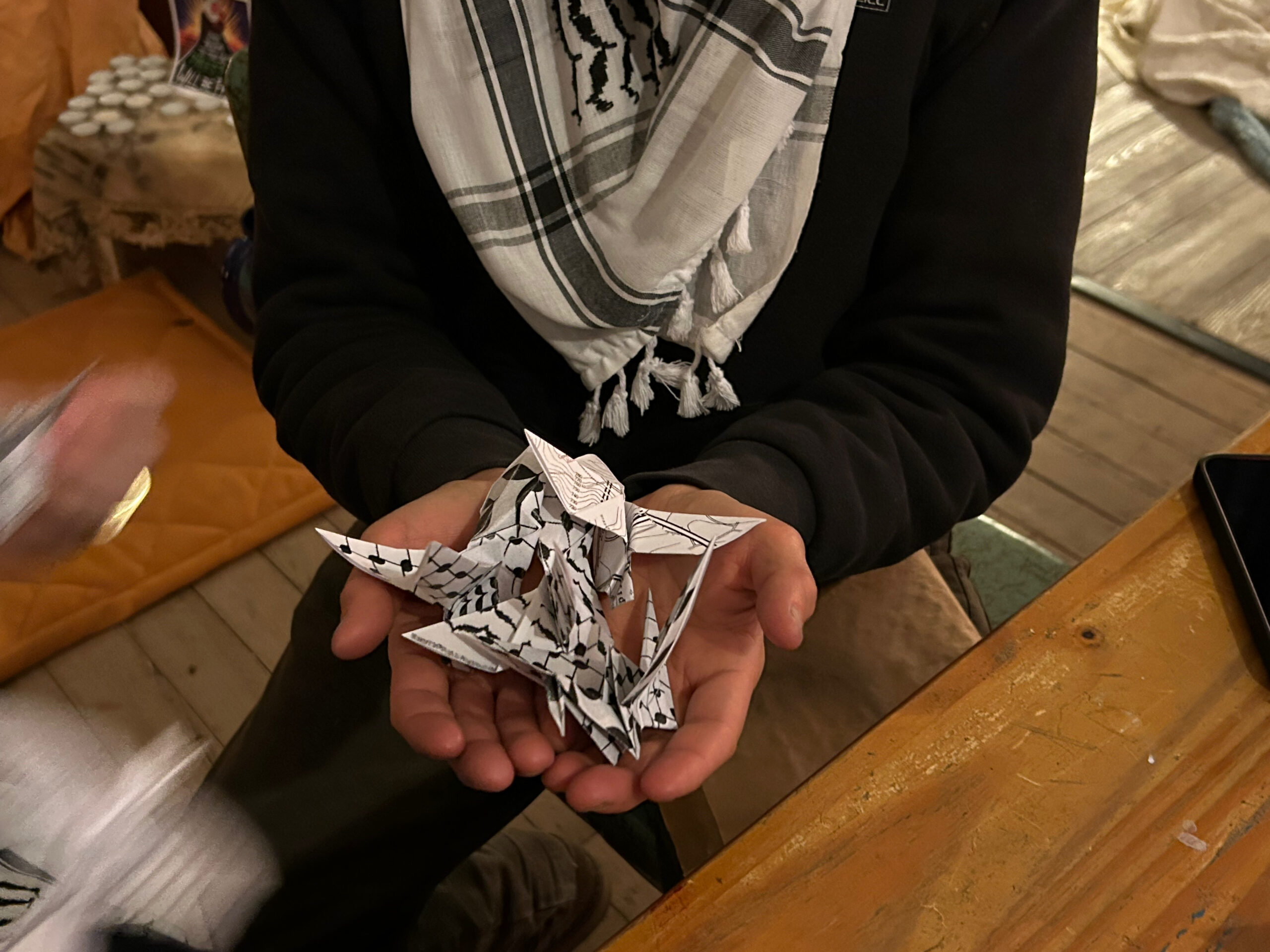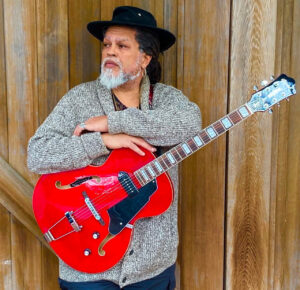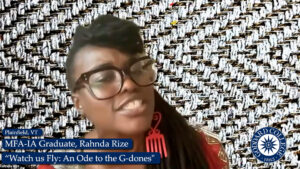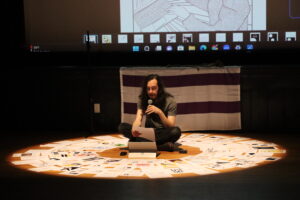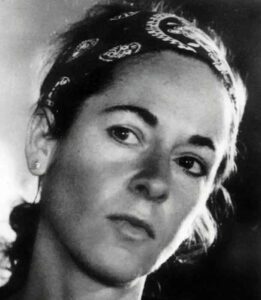
Photo: Pugs (Daniel Seung) Pugliese MFAIA’20
MFAIA co-Chair Ruth Wallen in conversation with recent graduates, Greer Reed and Adam Cates, MFAIA-VT F2020. During part three of this interview, conducted in November 2020, Greer and Adam continue to reflect upon their graduate studies at Goddard.
Ruth Wallen: Could you say specifically what you learned or how you grew during your graduate study at Goddard College?
Adam Cates: I had Peter Hocking in my second semester as an advisor. He was pushing me off in different directions, studying things related to my own self-identity, like gay theatre makers or gay history and different ideas about queer theory and identity in general.
I thought that I need to study musical theatre structure and playwriting. Peter says- “read this book about Weimar Germany and the sexual revolution of the 1920s”. I was a little resistant at first because I didn’t really understand why he was doing that.
It really set me on a path of realizing that part of the reason that I was struggling in my career in the commercial theatre is that I had separated who I was from what I was doing. He saw that. I didn’t see that. And he didn’t tell me that. He let me find that for myself which brilliant, of course.
What was the most transformative is that I had to learn how to put who I was into my work. That’s where my work really started to change, not only as a director and choreographer, but also as a playwright–approaching things from an auto-ethnographic viewpoint and putting autobiography into my work, telling my own story. Even if I was directing something somebody else wrote there was still a place for me to bring my who I am into the work.
I started loving what I was making again. I started loving what I was doing. I started connecting to it. I started being excited to talk about it and share it. I hadn’t really felt that for a really long time.

Photo: Kristen Martino
Ruth Wallen: Could you say something about the way you started to approach directing post-Goddard?
Adam: I do a lot of revivals and regional theater. For example, I was asked to stage a production of A Funny Thing Happened on the Way to the Forum, which is a show from the early sixties. There’s some great vaudeville comedy in it, but it also has a lot of problems in terms of the way the female characters are written. It ends up being really misogynistic. I was teamed up with a director so we decided to do a production where we didn’t change the gender of the characters, but we swapped the gender identity of the actor for the character, so most of the male roles were played by women and most of the female roles were played by men. We told the story through a contemporary lens so that we could mine the comedy and be entertaining but also indict the writing and make this show that was written sixty years ago relevant for today.

Greer Reed: Adam just reminded me that his journey is very similar to my journey. I feel like Goddard is the kind of place where you find yourself as an artist, where you find where you fit in. It wasn’t until Goddard that I really had to step back and look in the mirror to deal with some Greer things.
I would get into these long conversations, let’s say with Erica, about my practice and this dancer and that dancer and education. She would listen very politely, and then, say, Okay, that’s great, what about Greer? It was the first time that I was, in a very lovingly and supportive way, forced to deal with me, what was I bringing to the table and what my students are getting from me. I started to realize that I was regurgitating things that I had heard, things that I had learned. I was using some of the things that when I was very young really turned me off to dance altogether.
Goddard helped me to figure those things out. What I came up with is really a very holistic way of teaching–making sure that my dancers are physically, emotionally mentally, spiritually holistically healthy.
We were taught- leave your problems outside of the studio. Then when you leave, pick them up. What I realized was that those issues that I was leaving on the outside of the studio were exactly the things that I needed to take inside of the studio. That was the real Greer, that was the stuff that I needed to deal with. I didn’t realize that inside of the studios was a brave space to do that. Now I think back that when I was heartbroken, that’s when my best work came out. I danced my absolute best when I had nothing else except to turn inside and leave it on the dance floor, inside the studio or on the stage.
I am so passionate about the mental health and the spiritual health of young people, because that is what’s so important. I’m not really concerned with whether they get the plié right, or the tendu. I could care less. It’s not just about bending your knees, but what you are. What are you saying; what you are giving? I know I’m different from other educators. But for me it’s important that the plié is a healthy one.
I definitely want to go on to work on my doctorate. I am so passionate about art psychology and dance psychology. I want to study something about the mental health of artists in dance in particular, maybe go deeper in how to support African-American males.
Adam: Greer can you also talk about the whole tradition of like African Diaspora dance and things that your thesis was about? It’s so much more than the movement. It really is. It’s connecting to roots and culture. I learned so much from you.
Greer: It’s about the honoring, paying homage to those who’ve come before us, making sure their voice continues to live. We stand on their shoulders. I tell my kids, if you don’t stand for something, you’re gonna fall for anything. If you go on to be a dancer or an artist, you have to have some sort of foundation, something to stand on. If not you’re just kind of out there, really not really connected to anything.
Adam: It’s a spiritual foundation, an emotional foundation and a physical foundation. You’re building community.
Greer: That’s what Goddard is. I don’t know if your family and friends said this to you. I’m sure they did. For graduation and all the graduating presentations my family and friends were saying, “Can I go to Goddard?” That’s why I think the whole virtual graduation was really a blessing. It gave my whole community a chance to see what I’d been talking about for two and a half years. They were like, “Oh my gosh, I had no idea. Can I go to Goddard? How do I enroll? How do I sign up?” The love and the support unconditional support and all those things was so evident, even in that small time virtually.

Photo: Pugs (Daniel Seung) Pugliese
Ruth: That’s wonderful to hear. This has been such a rich conversation. Is there anything else that you would like to share?
Adam: For anybody that is on the fence I would say, take the plunge. Go for it. Everybody’s journey is unique. At the beginning, I didn’t really know what I was doing, what I was studying. I didn’t really know how it all came together until the end of my fourth semester. You’re going to come out a changed artist and a changed person if you trust the process and go for it.
Greer: I would say that Goddard is truly a brave space. It’s kind of weird to say, but I never felt like I was in school. It was a two-and-a-half-year journey that I spent researching more, digging more into my practice. I always looked forward to residences. Jason and I used to count down the days to the residency because we needed to be fed as artists. The moment we arrived on campus each and every time it was like a retreat to refuel. It never really felt like I’m in school and I’m working on my graduate degree. It’s so much more than that. It’s so much more than that.
Did you miss Part One, an interview with Greer Reed or Part Two, an interview with Adam Cates?
Tell your story and start your new path at Goddard College. Find out more about this unique low-residency program at https://www.goddard.edu/academics/master-fine-arts-interdisciplinary-arts/ or inquire at Get Info

